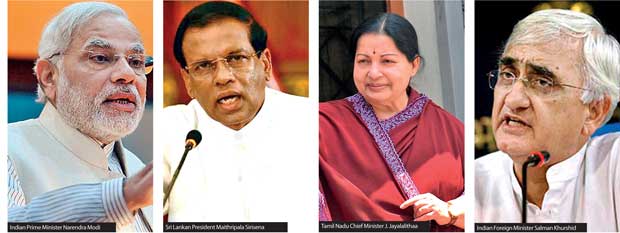14 Jun 2016 - {{hitsCtrl.values.hits}}

“Could a state hostage the central government’s decision especially affecting its foreign policy towards another nation? State can’t put pressure for the central government decisions. I am tired and like Muhammed Ali I will allow them to punch me continuously but wait for the right moment to strike,” said Salman Khurshid, the then Indian external affairs minster, at the Asian Relations Conference held in 2013 at the Indian Council for World Affairs, New Delhi.
He said this the same day India voted for the UN Human Rights Council resolution against its neighbor Sri Lanka due to much pressure from south India. It is worth remembering the incident and the statement to forecast how much pressure the southern Indian state of Tamil Nadu has and could lay on New Delhi in the future regarding relations between the two countries. India’s Sri Lanka policy had for long been hostage to the Tamil Nadu political parties’ stand on the Sri Lankan Tamils issue.
Dual citizenship
During the election campaign, the recently reelected Chief Minister of Tamil Nadu, Jayalalitha, had promised that her party would pressure the Centre to provide dual citizenship to Sri Lankan Tamils in Tamil Nadu and to create a separate Eelam (state) in Sri Lanka.
This would fulfil the dream of the defeated terrorist leader of the Liberation Tigers of the Tamil Eelam (LTTE) Prabakaran’s dream. With Jayalalitha’s victory in the state elections, the Sri Lanka South India relationship is back to square one. Sri Lankan President Maithripala Sirisena would have to navigate his New Delhi-Colombo relationship with all these external political pressures.
Over her election campaign in 2009, she had said, “We will fight to attain that independent, separate Eelam. Till today, I have never said that separate Eelam is the only solution. I have spoken about political solution, this and that. But, now I emphatically say, a separate Eelam is the only permanent solution to the Lankan conflict.” This demonstrates clear indication of repetition in each election of a promised land with much better hope to the Tamils. The poaching and acquisition of Kachativu Island is also played up during the election time. Meanwhile, in Sri Lanka, Chief Minister of the Northern Province V Vigneswaran congratulated and admires her statement. Furthermore, both chief ministers will meet in the near future most probably without the consent of their central governments.
Seeking external assistance from Jayalalitha for Sri Lankan Tamils is a comical move while previous government and this government has provided so much assistance to the northern Tamilians. The recent request by Chief Minister Vigneswaran to evacuate the army from Sri Lanka’s northern peninsula could antagonise the national security of the entire country. Sri Lanka has come out of a three-decade war with deep scars and security should still be a top priority. Strengthening intelligence and security of the island nation should not be compromised for any political gains of individuals. On another dimension, we could see another threat slowly emerging with over 50 Sri Lankans having joined the terrorist group, Islamic State.
Modi’s US ties
If one looks at regional geopolitics, Indian Prime Minister Narendra Modi has elevated the US-India relationship to significant heights. Sometime back, Modi was barred from entering the US due to concerns of the 2002 riots, but is now a favorite of the US. Few days ago, during his visit to the US, speaking at Capitol Hill, Modi expressed his interest in deeper US-India security relations, especially combating terrorism together. Both India and the US have lost many civilians and soldiers during the fight against terror and the need of the hour is to deepen our security cooperation.
The Prime Minister also stated the regional concerns of Chinese expansionism – a much discussed topic at the recent Shangri-la Dialogue.
When asked as to what India’s position will be if Sri Lanka gets another Chinese submarine port call, the Indian defence minister said it will be looked at case by case. Yet, it is necessary to have a proactive defence strategy among the two nations than firefight in such situations.
There are 48 warships under construction for the Indian Navy, including one aircraft carrier, one nuclear and six conventional submarines, and a variety of destroyers, frigates and corvettes. By 2027 the capacity will be expanded to hold 198 warships. While a silent yet aggressive naval build-up is taking place in Sri Lanka’s neighborhood, Colombo should be ready to proactively face any future challenge as the Indian Ocean security environment is expected to remain complex. On 20 June, the Nuclear Suppliers Group meeting will take place in Seoul, South Korea. India is supposed to step in as a member of this group with the assistance of the US, which China has already resisted. If given membership, the regional geopolitical tension on the Indo-Pakistan and Indo-China fronts will be tense.
President Sirisena with his decades of political experience has so far clearly mastered his decisions on foreign policy with his short time in office. The India-Sri Lanka relationship has strengthened in a positive way than his predecessor. The success of the G7 and his last visit to China show clear indications of perfect balance of foreign policy. These events could only predict a scenario where a positive sum game will be played by President Sirisena, who could bring back the golden age of Sri Lankan foreign policy or even do much better than late Madam Sirimavo Bandaranayake, a close political friend of President Sirisena for many years.
(This article was initially published by the Institute of Peace and Conflict Studies (IPCS) New Delhi for “Dateline Colombo” http://www.ipcs.org/article/peace-audit-and-ceasefire-monitor/new-delhi-tamil-nadu-relations-and-indias-sri-lanka-policy-5058.html)
10 Jan 2025 1 hours ago
10 Jan 2025 2 hours ago
10 Jan 2025 4 hours ago
10 Jan 2025 4 hours ago
10 Jan 2025 4 hours ago